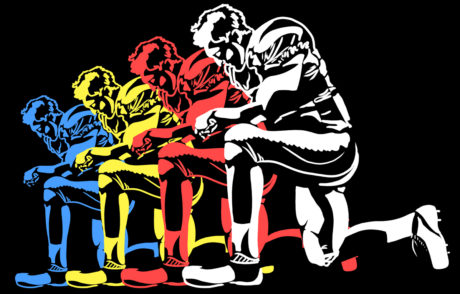This weekend, the news cycle was once again dominated by President Donald Trump. At both a rally in support of Alabama Senate candidate Luther Strange and on Twitter, Trump called for NFL players who protested by kneeling during the national anthem to be fired or suspended. Players responded by protesting in even larger numbers than before. This battle managed to set off an almost continuous stream of Facebook posts as everyone who had access to the internet attempted to give their two cents in on the issue. People have opinions ranging from wholehearted support for the players to wanting to disband the NFL.
Kneeling during the anthem as a form of protest started last season with Colin Kaepernick, a former quarterback for the San Francisco 49ers, who, prior to the protest, was most noted for giving Green Bay Packers and Boise State fans nightmares. Kaepernick was a rising star in the league until the 49ers began to decline in prominence. In 2016, Kaepernick began to protest during the national anthem by kneeling or sitting. When asked why, he replied, “I am not going to stand up to show pride in a flag for a country that oppresses black people and people of color,” as reported by the NFL. He cited a number of incidents between police and African Americans as reasons for his protest. He was heavily criticized by members of the media, current and former NFL players and politicians for his protest. The angles for criticism ranged from disrespect for the national anthem, the American flag, the American military and the American experiment to making an issue of a non-issue.
For the most part, before Trump’s comments this past weekend, the protests had been a sideshow for the season. The movement, had settled into a quagmire of attracting attention but not resulting in much action.
The issue of protesting during the national anthem is indicative of a deeper issue in the American psyche that has been festering: the issue of free speech and the first amendment. Some people happily lose their minds over anti-fascists setting fires on college campuses and orders that stop conservative speakers from being heard, but for some reason refuse to extend that right to freedom of speech to football players who wish to make their voices heard. In the same way, the opposite is true: Certain people gladly will set college campuses ablaze in order to make an environment too dangerous for a speaker they don’t want to hear, but then demand that NFL players be given the right to protest during the national anthem.
The truth is that people with differing beliefs on this issue have the right to make their opinions heard. However, they don’t have a right to force their opinion into other people’s actions. It is a first amendment stalemate. On this issue, as with all first amendment issues, it is important to listen to the other side’s explanation for why they do or do not support the protest. This will allow you to hear stories that you never would have otherwise heard and allow you to understand the world from someone else’s point of view. You will hear stories ranging from how every generation of someone’s family has put their lives on the line every generation for Old Glory to stories of racism and police brutality.

Personally, I don’t plan on protesting during the national anthem any time soon. I also don’t plan on criticizing anyone who wishes to. Two of the most important concepts in America are the right to free speech and the right to protest. Without these two important ideas, it becomes very hard to improve a country. If you don’t allow people to freely voice their concerns or bring attention to issues that they feel aren’t being properly addressed, then the country will not move forward. People have the right to peacefully protest and to voice their opinions even if you don’t like it.
Furthermore, this situation shows the current schism inside of America, where a significant amount of people refuse to attempt to understand where the other side is coming from and possibly refuse to account for the other side not having malicious intent. This situation, for the most part, is once again people talking past each other instead of to each other.






